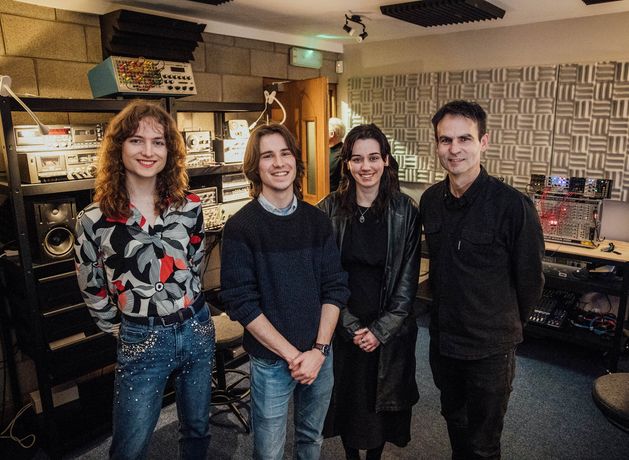Students of UL’s BSc in Music, Media and Performance Technology Síoda McCarthy, Andrew Knox, Aileen Evans with Jurgen Simpson, director of the Digital Media and Arts Research Centre at UL. Photo: Brian Arthur
University of Limerick has launched its new world-class electronic music studio, a first in the Irish academic landscape.
Located in the Digital Media and Arts Research Centre at the Department of Computer Science and Information Systems, the University of Limerick Electronic Music Studio (ULEMS) was officially presented with a talk by renowned Irish electronic music composer, Roger Doyle. This was followed by a concert to celebrate the event featuring performances by Paddy Mulcahy, Sharon Phelan, Jürgen Simpson, Neil O’Connor, along with Jonathan Impett and Juan Parro Cancino from the Orpheus Institute, Belgium.
The new ULEMS facility is dedicated to the art of electronic music. Featuring a wide range of digital and analogue instruments, this unique facility tells the story of electronic music practice through the 20th and 21st centuries. Packed with a wealth of analogue and digital synthesizers, it’s a first in the Irish academic landscape.
ULEMS enhances the existing Digital Media and Arts Research Centre music studios and the 36-channel spatial audio environment.
The centrepiece of the new studio is a newly commissioned Buchla 200e, an instrument that is rooted in the history of modular synthesis and regarded as one of the most ambitious of its kind.
The ULEMS also offers composers access to tools and instruments by Roli, Schlappi Engineering, Nord, Doepfer and Eventide as well as sophisticated recording and surround sound monitoring.
This new studio will support students of the BSc in Music, Media and Performance Technology and the BSc in Interaction Design undergraduate courses, as well as visiting national and international composers.
Jürgen Simpson, Director of UL’s Digital Media and Arts Research Centre, said: “For over 25 years, UL has played a key role in the development of electronic and computer music in Ireland, supporting education, research and reaching out to the wider community through conferences, festivals and partnerships. We are delighted to present this new facility which offers students and guest artists a unique opportunity to explore the rich possibilities and heritage of electronic music instruments”.
It was announced at the event that UL’s Digital Media and Arts Research Centre will be partnering with the Contemporary Music Centre, Ireland’s resource centre for new music, to facilitate a composer-in-residence programme starting in 2025. Through this scheme, Irish and international composers will have the opportunity to work in this space.

